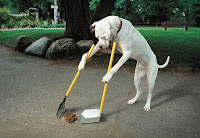| Level 3 bite |
Well known veterinarian, dog trainer, and behaviorist Ian Dunbar has developed a six level system of classifying bites, in order to make discussions of biting behavior more consistent and understandable.
Why is the relevant? When an owner calls me and frantically says their dog has just chased and bitten a neighbor, I often discover the horrible
bite was actually only a scratch. I feel good being able to tell the owner
that while we need to lower their dogs Predatory Behavior, their dog has a fairly soft mouth. Many dogs have a predatory or high chase impulse
because it is normal dog behavior, and yes, it can be counter conditioned or modified.
Teaching your dog to use soft jaws on humans is the most important thing you can teach your dog. Playing Tug with appropriate rules such as Take it and Leave it and playing the Claw are good ways of giving your dog feedback on his bite pressure.
Why is the relevant? When an owner calls me and frantically says their dog has just chased and bitten a neighbor, I often discover the horrible
bite was actually only a scratch. I feel good being able to tell the owner
that while we need to lower their dogs Predatory Behavior, their dog has a fairly soft mouth. Many dogs have a predatory or high chase impulse
because it is normal dog behavior, and yes, it can be counter conditioned or modified.
Teaching your dog to use soft jaws on humans is the most important thing you can teach your dog. Playing Tug with appropriate rules such as Take it and Leave it and playing the Claw are good ways of giving your dog feedback on his bite pressure.
Ian Dunbars Bite levels are as follows:
Level 1 Bite – Harassment but no skin contact. This is the
so-called snap. Don’t kid yourself. A snap is an intended
“air bite” from a dog who did not intend to connect. He
didn’t just “miss.” It is a lovely warning signal, telling us that
we need to identify his stressors and either desensitize
him or manage his behavior to avoid exposing him to the
things that cause him undue stress.
Level 2 Bite – Tooth contact on skin but no puncture. Again,
this is a bite from a dog who didn’t intend to break skin,
and a warning that this dog is serious. It’s a very good idea
to remove the dog’s stressors at this point, before he graduates
to the next level.
Level 3 Bite – Skin punctures, one to four holes from a
single bite (all punctures shallower than the length of the
canine tooth).
Level 4 Bite – One to four holes, deep black bruising with
punctures deeper than the length of the canine (which means
the dog bit and clamped down) or slashes in both directions
from the puncture (the dog bit and shook his head).
Level 5 Bite – Multiple-bite attack with deep punctures,
or multiple attack incident.
Level 6 Bite – Killed victim and/or consumed flesh.


